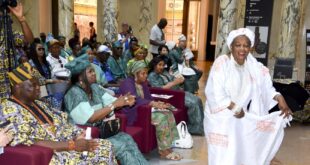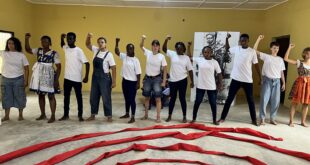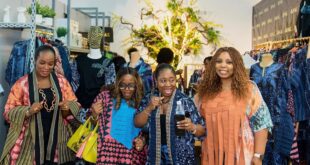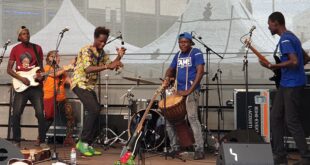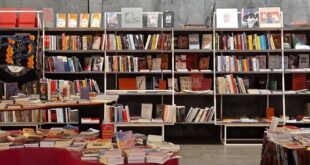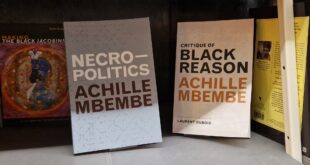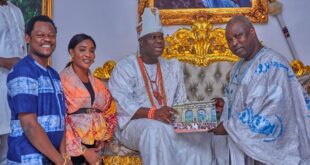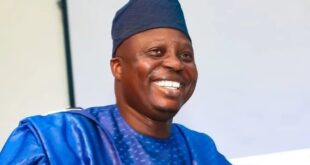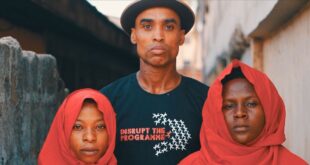Berlin-based writer Sharon Dodua Otoo won this year’s Ingeborg Bachmann Prize, an annual competition which took place for the 40th time this year on 3 July in the Austrian town of Klagenfurt and was televised live.
The competition, which is officially known as the Tage der deutschsprachigen Literatur (Festival of German-Language Literature) is one of the most prestigious literary competitions in German-speaking Europe.
Otoo, who received prize money of 25,000 euros, won the contest for her unpublished work “Herr Gröttrup setzt sich hin” (Mr Gröttrup sits down). The jury praised the effortless satire of everyday life in Germany, where an egg dares to revolt.
Otoo, who was born in 1972 in London as the daughter of Ghanaian-British parents, has lived in Berlin since 2006. Editor of the book series Witnessed, about the Black experience in the Diaspora, she has published in English and German and is also well known as a feminist journalist and an activist of the Initiative of Black people in Germany.
In an exclusive interview with The African Courier, Otoo talks about the prize, German society, the Black experience in Europe, the Black Lives Matter campaign in the United States and the role of writers in the struggle for a more inclusive society, among other issues.
Congratulations on the Ingeborg Bachmann Prize. What was your initial reaction after you were announced as the winner of the award?
Well, first of all I was really surprised. I kept having to pinch myself, so to speak, because I had taken part in the competition with no expectations of a prize at all. I mean, I really liked my story and was confident that I would be happy with my own performance. But I did not expect that the judges would all also like it, let alone vote for me to win the top prize.
Your winning entry text “Mr Gröttrup sits down” was praised by the jury for its effortless satire of everyday life in Germany. What is the central message of the text about German society?
I try to gently point out that we all have limits to our knowledge and experience. And that no matter how much we think we know, how clever or qualified we are, there are always those who have a different form of insight. And that it would be worth trying to take a step back and finding out more from those around us, especially those who are underestimated far too often.
What has changed for you as a writer since winning the award?
My feeling for being in control! I used to think I was good at organising my paid-work, activist-work and domestic-work commitments. Now I’m lucky if I remember to take my phone with me when I leave my home. It is a complete whirlwind at the moment. I hope it calms down soon!
Your Witnessed series focuses on the Black experience in Germany. What would you describe as the common threads in the works you have published in the Series about the Black experience in this country?
Whenever I remember, I try to talk about Black experiences in Germany [plural] because I am learning all the time that there is not one homogenous Black experience. The Afro-German young man will have different perspectives to the West African middle-aged woman. And once we factor in sexuality or religion or citizenship, for example, we realise Black communities are just as diverse as any other community. That’s why there are very few restrictions to the format of the work presented in Witnessed. We have an anthology, a photo book, two plays and a collection of short stories. There is definitely scope for going further.
What does the situation of Black people in Germany today look like to you?
It’s difficult to say, because as I just described, the situations are vastly different depending on a range of other factors. There are some structural factors I would highlight though. For example, the urgent need to update German school books regarding the image of Africa that is presented in them. Luckily many individuals and initiatives have been working tirelessly on this and their work is finally beginning to bear fruit.
We also have a serious issue concerning racial profiling in Germany – a human rights violation which most negatively affects people of the African Diaspora. Again we have organisations which are networked and campaigning on various levels to raise awareness politically as well as in the criminal justice system itself.
What can Black people do to better assert themselves in society?
They are already doing a magnificent job! The campaign for equality is a massive one – the work will not be completed in my lifetime and probably not in the lifetime of my children. I am still confronted on a daily basis with people who do not even see discrimination as a reality which many of us are confronted with and have developed strategies against. Where there is so much denial, I think it is important that Black people continue the work but remember to also take care of themselves, to support one another and to choose their battles carefully. As Audre Lorde said: “Caring for myself is not self-indulgence, it is self-preservation, and that is an act of political warfare.”
As a British writer who has lived in Germany for 10 years, what would you describe as the differences between the experiences of people of African descent in Britain and Germany?
I can really only speak about my experiences of living in London and Brighton in the UK and Berlin in Germany. So the first big difference is visibility. There are areas in London where the street life is 90 per cent made up of Black people. Therefore things like hair products or make-up, but also literature and artwork with African Diasporans in mind are freely available in these areas. I know of no such area in Berlin.
Another difference I would classify under language. In my opinion English in South-East London is a very flexible affair. It is commonplace to hear English spoken with a West African or Jamaican accent, it is also commonplace for a Black person to speak the Queen’s English or with a broad Scottish accent. This is simply a fact of life.
Furthermore, I believe it is well-known and widely accepted that certain words (apparently intended to describe Black people) are insulting and this is not up for discussion. Finally, when I lived in the UK, I was always British. I was also “Black” but this was understood as a political term and was not code for “is not really British”. The situation in Germany is very different.
What do you think are responsible for these differences?
Some people explain it away with ideas of colonial continuities and commonwealth. I am not sure about that. Germany had colonies also – it is just not part of the dominant discourse to remember this. I think, however, that Germany’s conception of itself as a White country does have something to do with cultural production, with folklore and with the legacy of the genocides which took place here during World War II.
Let’s go across the Atlantic. Isn’t it a paradox that African-Americans still have to contend with institutional racism in the law enforcement and justice systems despite having a Black president?
Nope. Why would anyone think that because one man was voted into one position for a period of eight years that he would be able to undo the havoc that centuries of institutionalised racism have inflicted on the continent?
I would even say it makes total sense that these problems are still present, because very often Barack Obama was held up as proof of the existence of a “post-racial” USA. Which is a very tempting thought, but it made it even more difficult for people to then point out the inequalities and injustices which still exist in the States.
What do you consider as the role of writers in the struggle for a more inclusive society?
I strongly believe that all writers have a role in shaping the society they publish in – and they are in turn shaped by their societies. We act as keepers of the imagination. We have the opportunity to draw attention to and highlight continuities in the human condition.
We can communicate current social and political situations in an empathetic way. Elie Wiesel, an author who died on the same day I read in Klagenfurt, considered himself to be a witness. That he had a duty to speak for those who did not survive the genocide in Nazi Germany.
Femi Awoniyi
About Sharon Dodua Otoo, in her words:
“I am Black British mother, activist, author and editor. Black is deliberately written with a capital B. Parenting is the single most important thing I do. With each child I have, I hope to get better at it.
Apart from that, I edit the book series Witnessed. The first publication of the series is The Little Book of Big Visions. How to be an Artist and Revolutionise the World was co-edited with the curator Sandrine Micossé-Aikins (edition assemblage, 2012). The latest edition of Witnessed, Winter Shorts, was co-edited with the writer, blogger and poet Clementine Burnley (edition assemblage, 2015).
Editing is something I like doing a lot. I love writing, though. My first novella the things i am thinking while smiling politely was published in February 2012 (edition assemblage). The German language translation, “die dinge, die ich denke, während ich höflich lächle” by Mirjam Nuenning, appeared in October 2013. My latest novella Synchronicity (again translated into German by Mirjam) appeared in August 2014 and was published in English at the end of 2015 with the title Synchronicity – the original story.
And… my favourite book is Beloved by Toni Morrison.”
 THE AFRICAN COURIER. Reporting Africa and its Diaspora! The African Courier is an international magazine published in Germany to report on Africa and the Diaspora African experience. The first issue of the bimonthly magazine appeared on the newsstands on 15 February 1998. The African Courier is a communication forum for European-African political, economic and cultural exchanges, and a voice for Africa in Europe.
THE AFRICAN COURIER. Reporting Africa and its Diaspora! The African Courier is an international magazine published in Germany to report on Africa and the Diaspora African experience. The first issue of the bimonthly magazine appeared on the newsstands on 15 February 1998. The African Courier is a communication forum for European-African political, economic and cultural exchanges, and a voice for Africa in Europe.





